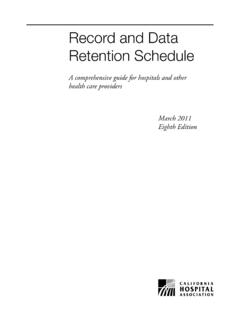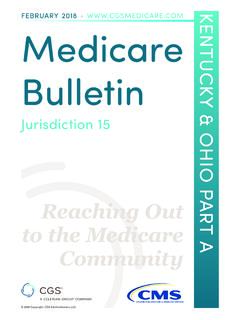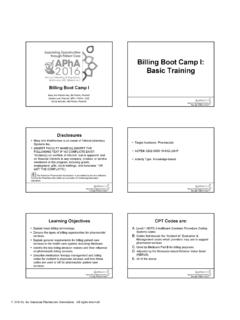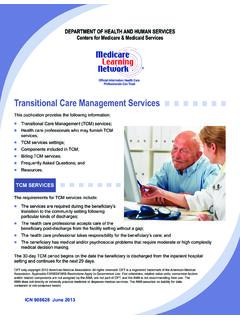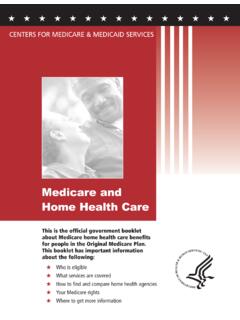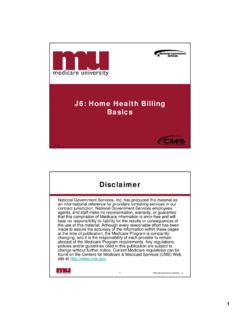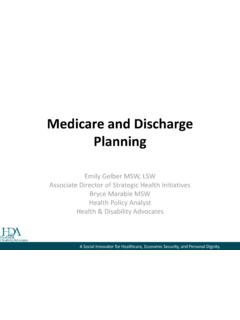Transcription of Medicare-Required SNF PPS Assessments
1 1 DEPARTMENT OF HEALTH AND HUMAN SERVICESC enters for medicare & Medicaid ServicesMEDICARE- required SNF PPS ASSESSMENTSICN 909067 February 2016 Please note: The information in this publication applies only to the medicare Fee-For-Service Program (also known as Original medicare ).Skilled Nursing Facilities (SNFs) must assess the clinical condition of residents by completing required Minimum Data Set (MDS) Assessments . You must complete them for each medicare resident receiving Part A SNF-level care for reimbursement under the SNF Prospective Payment System (PPS) in a covered Part A educational tool provides the following information for SNF providers: MDS background; Assessments overview (including scheduled, unscheduled, and combined Assessments ); Factors affecting the assessment schedule; assessment results reporting; and A table of TermsAdmission The date an individual enters the facility and admits as a resident.
2 A day begins at 12:00 and ends at 11:59 Indicator (AI) A code used on a medicare claim to indicate the type of assessment billed on the Reference Date (ARD) The last day of the observation period the assessment Window The defined days when you must set the ARD. This does not include grace Days The date range when you may set the ARD without penalty. Grace days apply only for scheduled Window The defined days when you may set the ARD. This includes grace days as SNF PPS AssessmentsMDS BackgroundThe MDS is a core set of elements, including common definitions and coding categories, which forms the foundation of a comprehensive assessment for all residents of nursing homes certified to participate in medicare or Medicaid.
3 The screening, clinical, and functional status items in the MDS standardize communication about resident problems and conditions. The MDS contains items that reflect the acuteness of the resident s condition, including diagnoses, treatments, and functional status. MDS assessment data is personal information SNFs must collect and keep confidential according to Federal law. State assessment RequirementsCheck your State requirements to ensure you meet them. Contact your State RAI coordinator with questions. For State RAI contact information, refer to on the Centers for medicare & Medicaid Services (CMS) MDS is one of three components of the Resident assessment Instrument (RAI).
4 The other two components include: Care Area assessment (CAA) Process Assists with systematic interpretations of the completed MDS ; and RAI Utilization Guidelines Provides guidance on when and how to use the complete RAI yields information about a resident s functional status, strengths, weaknesses, and preferences and offers guidance on further assessment once you identify MDS classifies residents into a Resource Utilization Group Version IV (RUG-IV) based on the average resources needed to care for someone with similar care needs. RUG-IV classifications help medicare determine the Part A SNF PPS payment. The RUG-IV classification system includes eight major classification categories: Rehabilitation Plus Extensive Services; Rehabilitation; Extensive Services; Special Care High; Special Care Low; Clinically Complex; Behavioral Symptoms and Cognitive Performance Problems; and Reduced Physical SNF PPS AssessmentsFor more information on the MDS RAI and RUG-IV categories, refer to the MDS RAI Manual, Chapter 6, available to download at on the CMS CodesAll SNF claims must include Health Insurance Prospective Payment System (HIPPS) codes for the Assessments billed on the claim.
5 This is a five-digit code that consists of a three-digit RUG-IV code and a two-digit OverviewThe SNF PPS establishes a Medicare-Required PPS assessment schedule. Each required assessment supports reimbursement for a range of days of a Part A covered stay. The schedule includes Assessments performed around Days 5, 14, 30, 60, and 90 of the stay. Additional unscheduled Assessments are required under specific circumstances. The next sections discuss the types of scheduled and unscheduled Medicare-Required PPS AssessmentsThe Medicare-Required PPS assessment schedule includes 5-day, 14-day, 30-day, 60-day, and 90-day scheduled Assessments .
6 Except for the first assessment (5-day assessment ), each assessment is scheduled according to the resident s length of stay in medicare -covered Part A the Medicare-Required 5-Day assessment when: The Part A resident admits to the SNF; The Part A resident readmits following a discharge assessment when return was not anticipated; The Part A resident returns more than 30 days after a discharge assessment when return was anticipated; and The resident leaves a medicare Advantage (MA) Plan and becomes covered by medicare Part A (the medicare PPS schedule starts over as the resident now begins a medicare Part A stay).SNF providers must complete these scheduled Assessments according to the schedule and information in Table SNF PPS AssessmentsConducting the AssessmentEach assessment must: Accurately reflect the resident s status; Be conducted or coordinated by a registered nurse with the appropriate participation of health care professionals; Include direct observation, as well as communication with the resident and direct care staff on all shifts; and Cover the Observation (Look Back) Period.
7 The Observation Period is the time period when the resident s condition is captured by the MDS assessment . Do not code anything on the MDS that did not occur during the Observation : assessment Window = ARD Window + Grace DaysTable 1. Scheduled AssessmentsAssessment TypeAIARD WindowGrace DaysMedicare Payment Days5-day10 Days 1 5 Days 6 8 Days 1 1414-day20 Days 13 14 Days 15 18 Days 15 3030-day30 Days 27 29 Days 30 33 Days 31 6060-day40 Days 57 59 Days 60 63 Days 61 9090-day50 Days 87 89 Days 90 93 Days 91 100 Scheduled assessment CalendarUsing the tool available in the interactive version of this publication at on the CMS website, enter the first day of Part A care in the field under Day 1 (mm/dd/yy).
8 Dates when you can set the ARD, grace days, and dates when you cannot set the ARD will populate for you. The calendar is organized according to the medicare payment period. To assure proper functionality of the Scheduled assessment Calendar, please download a copy of the SNF PPS AssessmentsUnscheduled Assessments You must complete Assessments outside of the scheduled Medicare-Required Assessments in the situations described in Table 2. Unscheduled assessment TypesAssessment TypeAssessment AcronymDescriptionSignificant Change in Status AssessmentCalled the Swing Bed Clinical Change assessment for swing bed providersSCSAC omplete when the SNF interdisciplinary team (IDT) determines a resident meets the significant change guidelines for either decline or significant change is a decline or improvement in a resident s status that: Will not normally resolve itself without intervention by staff or by implementing standard disease-related clinical interventions and is not self-limiting (for declines only); Impacts more than one area of the resident s health status.
9 And Requires interdisciplinary review or revision of the care significant change may require referral for a Pre-admission Screening and Resident Review evaluation if a mental illness, intellectual disability, or related condition is present or Correction to Prior Comprehensive AssessmentSCPAC omplete when a significant error was made in the prior comprehensive significant error is an error in an assessment where: The resident s overall clinical status is not accurately represented (that is, miscoded) on the erroneous assessment ; and The error was not corrected via submission of a more recent significant change differs from a significant error because it reflects an actual significant change in the resident s health status and not incorrect coding of the MDS SNF PPS AssessmentsTable 2.
10 Unscheduled assessment Types (cont.) assessment TypeAssessment AcronymDescriptionStart of Therapy-Other medicare required AssessmentSOT-OMRAC omplete only to classify a resident into a RUG-IV Rehabilitation Plus Extensive Services or Rehabilitation group. If the RUG-IV classification is not a Rehabilitation Plus Extensive Services or a Rehabilitation group, CMS will not accept the assessment and you may not use it for medicare is an optional of Therapy-Other medicare required AssessmentEOT-OMRAC omplete when: The resident was in a RUG-IV Rehabilitation Plus Extensive Services or Rehabilitation group; The resident does not receive any therapy services for 3 or more consecutive calendar days; and The resident continues to require Part A SNF-level with ResumptionEOT-RComplete when: Therapy resumes after the EOT-OMRA; Therapy resumes within 5 days after the last day of therapy.





